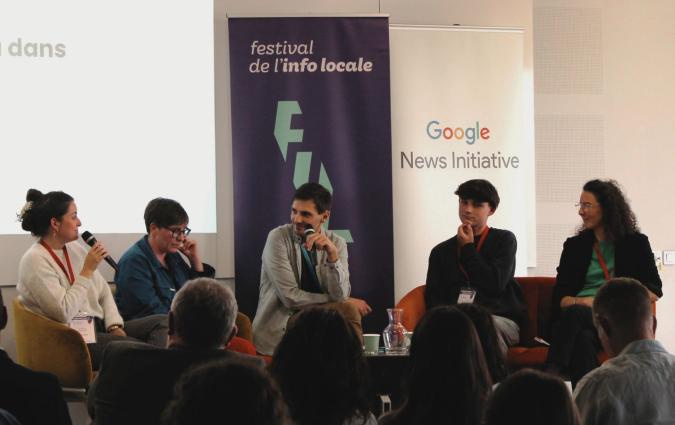Our podcast: Digital News Report 2021. Episode 4: Local news unbundled: where audience value still lies

Read this year's Digital News Report here.
The topic
This episode of our Digital News Report podcast series focuses on how people engage with local news, and the sources of information, including local news outlets, social media and others, that news audiences use for various topics.
The speakers
Dr Anne Schulz is a postdoctoral Research Fellow at the Reuters Institute for the Study of Journalism. She researches questions surrounding news audiences and digital news. She has authored chapters on local news for our Digital News Reports.
Our host Federica Cherubini is Head of Leadership Development at the Reuters Institute for the Study of Journalism. She is an expert in newsroom operations and organisational change, with ten years' experience spanning major publishers, research institutes and editorial networks around the world.
The podcast
The transcript
On what people want from local news ↑
Federica: Local and regional news media has been under immense financial pressure in recent years. Local newspapers in particular have been hit hard by disruption to both consumer behaviour and business models and the pandemic has only increased the pressure. And this is troubling because local and regional news media can play a critical role in informing citizens and underpinning democratic processes as we’ve seen the value of a return to service journalists specifically on local news during the pandemic.
Anne, you dedicated a chapter in the report to local news and looked at what topics matter most to audiences today and where they think they get the best information on each of them. Broadly speaking, what do people want to know when it comes to local news? What information about the area they live in do people actually care about?
Anne: Yes. So we asked our respondents which local topics they had accessed in the week ahead of taking the survey and we offered them a list of 15 topics to pick from and, out of this list, two topics were accessed most across countries. That was the weather and also local information about coronavirus or how much the pandemic had affected the area. So around half across our samples said they had accessed either of these. For all other topics out of that list of 15, the self-reported access rates were much, much lower than that. So local politics, just to pick that one out, which ranked third in many countries – only around 30% of those who we’ve asked across markets were said to have accessed it in the week ahead of the survey. So respondents didn’t really seem to care so much about all of the other topics that we had listed. Crime being accessed quite a bit in a few countries where this is more of an issue if you will. But information on the local economy or even schools and education weren’t accessed by more than a fourth or a fifth in our whole sample. This is quite striking I would say. Also if we compare this to last year’s Digital News Report Survey where we found that many actually say they are very or extremely interested in local news more generally but, when asked about what types of local information people have actually accessed, these figures are much, much lower. So there’s this interesting difference between people’s abstract interest and then their basically practical engagement.
On local news interest by country ↑
Federica: You mention different countries had a bit of a different result. Can you tell us more about some of these? How many of these findings are persistent across countries and how much they vary?
Anne: We find quite a lot of variation between countries indeed. So even if we just compare among European countries we see some notable differences. So we have Norway, for example, which I will refer to quite often in this podcast probably, where people are relatively interested in a range of different local topics. Taking out local politics as an example again; 43% of our respondents in Norway said to have accessed information about their local government in the week ahead of the survey. And although this is still below half which we also have to acknowledge, but if you compare this to the UK only 17% said to have accessed local political information so that number in the UK appears really quite small compared to Norway.
On attachment to local community ↑
Federica: This year you were also able to look at how a sense of attachment to one’s local community influences local news consumption. What did you find out?
Anne: Yeah. That’s a very interesting topic. So if you feel connected to your local community in whichever way – whatever that means to you – you will also be more likely to be interested in following local news and this has been shown to be true in previous research on the individual level in the way that I’ve just described. And with our cross-country data, we can show that this also translates to the aggregate level. So, in other words, in countries where we find higher levels of community attachment across the sample, people in that country will also report higher access rates of local topics on average. This, in itself, probably isn’t too surprising but it does make an interesting point about how local news in some markets might actually have it harder to create interest in their outlet and in their news provision. So when you are a news organisation that tries to operate in a market with generally lower levels of community attachment it will be more difficult to get people reading it compared to when you work in a market where people feel somewhat more strongly connected to their area and they might then also just want to know more about what is going on and seek out local news more frequently.
So if you want to you can think about this as a sort of opportunity structure that can help local news businesses to begin with. But just a final note on that; I think it’s also important to recognise that we’re talking about what I would refer to as an interdependency here where, of course, community attachment can to some extent drive local news access but where a well built local news business can also create community attachment over time. But, indeed, I think in countries where we have cultures where someone’s roots so to say are more important than just – to offer a comparison – than being very cosmopolitan so to say – it will be harder for local news to build a strong business.
On alternatives to local news media ↑
Federica: News organisations that provide local news also have several competitors to the service they provide so to speak; it could be social media, specialised websites and apps offering weather forecasting for example and local authorities, businesses, politicians – many of these provide regular news of their own on local issues using their own websites and social media pages. What did you find out about what alternative sources of local information people are turning to?
Anne: So we asked our respondents which sources of local news they think are best for each of the different local topics that they had selected in the beginning. So among these sources were traditional local sources like the newspaper, local TV but also all of these alternative providers that you’ve just mentioned like social media or also search engines. What we see is that for no topic there is a single source that comes out as strong. So even for local politics, the local economy our sample is basically split in half. So around 60% say that the traditional local news sources are the best source for getting information about local politics. That leaves 40% saying they prefer to search social media, other websites or, as you said, local politicians’ or governments’ direct communications. With coronavirus, it was pretty exactly 50-50. 50 traditional. 50 non-traditional. And a majority of them prefers to rely on social media and search engines when it comes to finding local jobs, housing opportunities or information on shops and restaurants. So this is where the local newspaper, radio and local television really have started to lose that battle against these alternatives.
On alternative sources across countries ↑
Federica: Once again, I’m curious – and maybe our listeners will be too – what kind of differences have you seen country by country?
Anne: Yeah. So we have some markets where things still look pretty good for traditional local media. Again, referring to Norway here as an example – where the local newspaper is still considered the best source for local politics with 71% actually of our respondents saying they go to the local newspaper as the best source for this type of information. In Germany, it’s 48% - dropped below the half – that say it’s the local newspaper for them and then another 25% say in Germany it’s TV or radio. So there is this majority that still refers to traditional local news sources on hard news topics. In the US, it is often local television that comes out as really strong with I think around 30% saying it is the best source for local politics and only 24% going to the newspaper. But, as I said, overall it’s traditional sources that are dominant here compared to social and search. But then things look pretty, pretty difficult for these traditional sources, for example, in the United Kingdom or also Japan just to name another example. It’s also important here, I think, to keep in mind these low access rates that we spoke about earlier. Just to reiterate, in the UK, only 17% told us that they had accessed local politics and, of these 17%, only 30% say that the local newspaper is the best source for that topic compared with – just to give you an example of non-alternative providers – compared with 33% who go to find local political information anywhere else online including search and social.
On what local news outlets should focus on ↑
Federica: Lastly, based on the research and your experience of working on this topic for a few years now, this is such a complex, of course, context for local news – also due to the small markets and willingness to pay by audiences where it’s very difficult to build a sustainable model. Based on your research and experience, what should a local news outlet who really wants to stand out from these many alternative sources of information, should focus on?
Anne: Super difficult question. I think what I can say is that what we see in this data is what we also referred to in the report as the “unbundling of local news.” So while especially the local newspaper traditionally performed many jobs for readers and they still do of course, many years in many countries in our survey now find that other sources are better able to perform these jobs. So against this backdrop, I think it will be very hard for local media – if not impossible actually – to drive demand for their product via these sort of topics. So what they are left with to monetise their businesses on are only these few topics like local politics, health issues, the local economy, local businesses. So a way forward could be to double down on these rather than trying to provide information on all topics and, in this sense, try and channel the resources that they have. But, of course, none of this will be easy in the current financial environment but I think it’s critically important to avoid a situation where local governments and local politicians are not subject to scrutiny from local media. So while I think this might be less of an issue that the local paper is no longer considered the best source for the weather, it will be crucial for local journalism and also, of course, local communities around the world not to lose the battle over political information.







